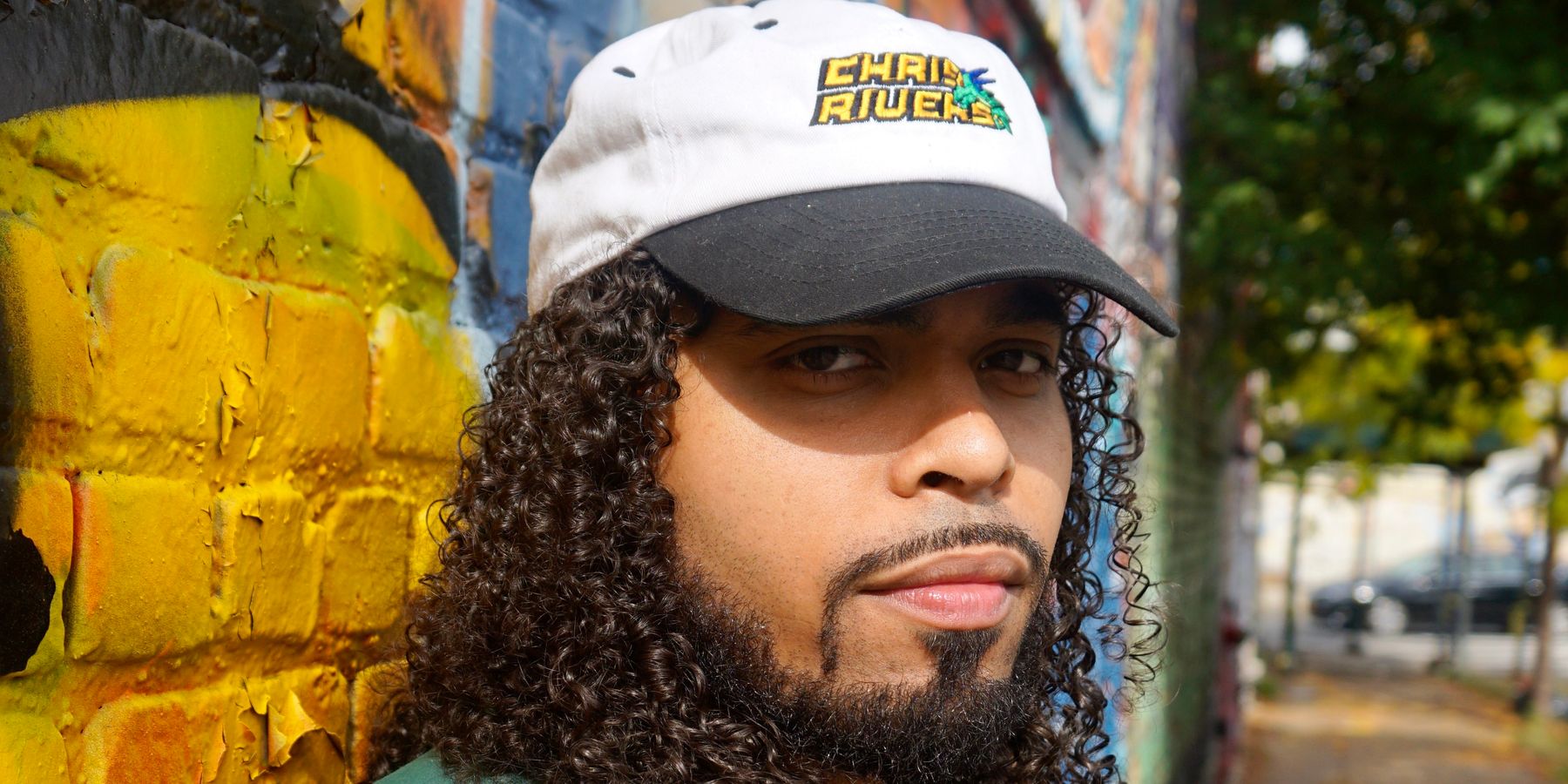
Care
Chris Rivers Wants You to Know You’re Worthy
Interview & Photography by Freddy Jesse Izaguirre
31 October 2019

There is so much wisdom flowing through the mind of Chris Rivers that it's easy to forget he's only 25. Back in August, the Nuyorican emcee dropped his sophomore album, G.I.T.U. (Greatest in the Universe) to critical acclaim.
The lead single "Sincerely Me," is a heartfelt track dedicated to the memory of his father, legendary rapper Big Pun, and has racked up over 210,000 views and counting on YouTube. The project mines its potency from River's own personal struggle to reclaim his life from the clutches of depression. It unfolds like an open letter, written to address the afflictions of the smartphone generation, while illuminating a path to guide them through their darkest moments.
Chris, the youngest of the Rios children, is a Bronx born-and-bred streetwise lyricist. He's a domestic violence survivor who passionately advocates for mental wellness and self-care. He's also mega punctual. I spot him waiting for me — he's hard to miss — while walking down Broadway in Soho. The vibe is immediately familial as he greets me with a warm hug. He's fitted in a multi-colored vintage Tommy Hilfiger sweater and black sweats paired with Nike AirMax lace ups that compliment his bright pink socks. We dip into one of those fancy check-in via app workspaces scattered throughout Manhattan, and he begins to tell me stories. Funny ones. It's one of his many gifts, and something he inherited from his dad.
Related | Noah Cyrus Examines Herself
We laugh about the time when as a kid, Rivers smashed into a post while rollerblading too fast down the hill on 163rd and Rogers, next to his father's mural in the Bronx. He explains to me why BX splits in two halves: the 4 train versus the 6. He shares his love for anime, why he's vegan (empathy for the animals), and that he wants to get into better shape so he can be Akuma from Street Fighter for Halloween in 2020. I look in his eyes. Their glass half-full earnestness wins me over.
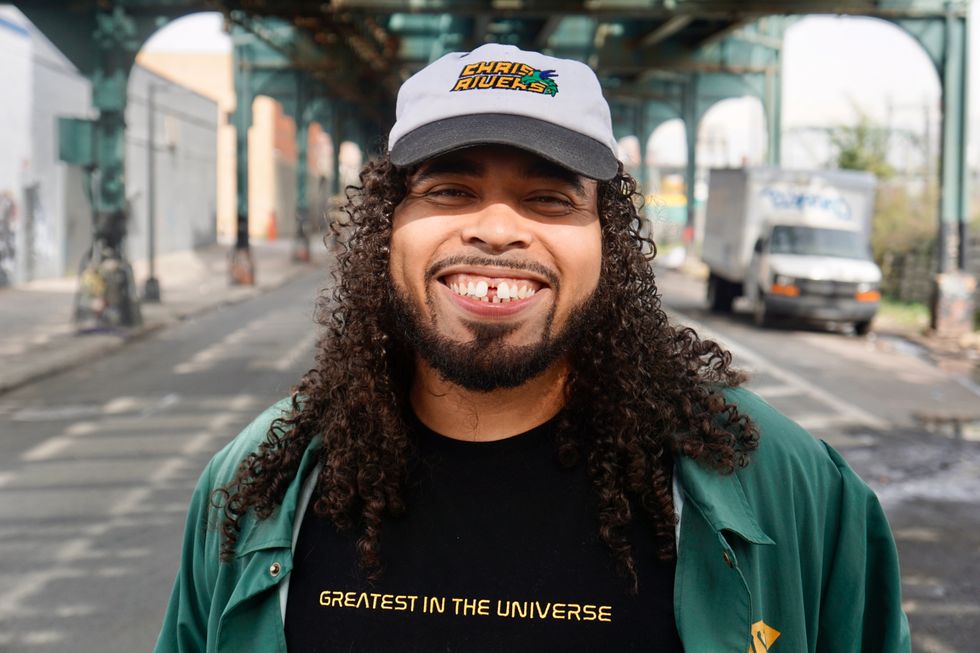
Rivers' mother didn't want him to be rapper. In fact, she encouraged him to live out his childhood dream of being a boxer. His unrelenting discipline was refined by his training with Boriqua legend Lou del Valle, aka "Honey Boy." In his teens, Rivers was on the cusp of qualifying for the Golden Gloves, but concern over whether he was at risk for Left Ventricular Hypertrophy (LVH) pumped the brakes on his dream of going pro. Spurred by his dad's history of heart problems and the bout with obesity that ultimately claimed his life, the Gloves' governing body wouldn't allow Rivers to participate unless it could rule that LVH wasn't a threat. All combined the tests to know for sure cost over $12,000. At the time Chris was broke, uninsured, and haunted by the uncertainty of homelessness.
Rather than letting his setbacks weigh him down, Rivers focused on making music. That set off a chain of events enabling Rivers to stage a Creed-level comeuppance. Doing so has allowed him to step out from behind the shadow of his pops, reconcile the messiness of his past, and emerge empowered by the independence of his own voice.
I spent two days walking and talking with Chris. We started downtown, but ultimately made our way up to the Bronx for an impromptu photoshoot at Concrete Park. We talked about the rapid gentrification of the borough, generational trauma, and the healing power of music. We also stopped for photo ops with fans, shared delicious meals, and talked about what healthy dating looks like in 2019. At every turn, it was evident that Rivers' future is rife with potential.
October is Domestic Violence Awareness Month. Chris Rivers is an example of someone who lived through such experiences as a child. The following interview contains references to violence and self-harm. It has been edited for brevity and clarity.
The honesty in your songwriting is so moving. What was the process like for you in putting G.I.T.U. together?
It was beautiful chaos. Like, honestly. Prior to releasing G.I.T.U., I released Delorean in 2017. So I'd been on a two year hiatus. Which is longer than any upcoming rapper should wait before putting out a project—and it wasn't intentional.
Why so long?
It was because I hated most of my music prior to that. Like, I really didn't like the direction...how it sounded. I was still trying to figure out myself as an artist. It was a hard journey, you know? And it's not like I'm seeing massive financial success or anything like that from it. So I'm like, yo, the least I could be getting is fulfillment and happiness and I wasn't even happy with what I was doing.
Related | 5 Signs a Relationship Is Abusive
Eventually, you got your groove back and started recording again.
Yeah, I lived in the studio. Keila [my partner] remembers—we barely spoke for like 2 months. I slept there. There were no windows in there so I didn't know what time of day it was. It was the hardest thing I've ever done, which is partly why I called the album G.I.T.U. (Greatest in the Universe). I'd repeat it as a mantra. I could be the greatest if I fully applied myself. I deal with a lot of self-doubt, so this was my way of proving to myself that I can make music that I like. I kept thinking is this good enough? Is it crazy? Then those thoughts would give way to moments of pure freedom and acceptance.
The press release for the album says, "...with G.I.T.U., Rivers stakes his claim as a singular artist, one speaking for his generation, his culture, his familial heritage, and most crucially, himself." What does that make you feel, hearing that?
If feels great because getting out of my dad's shadow, in the beginning [it] was like a mission. Like, and you gotta understand that it was bigger than just musically. It was in life, too. I watched him, between abusing my mother and the things that he did with us and seeing how he was as a father and as a husband. I gauged my entire life off of trying to be a better father and person than him. But, I ended up overcompensating. I wound up in toxic relationships. I mean, I'm 15 years old trying to marry the girl that I'm with...like, we're just kids! When I started doing music, and I naturally had his cadence and his sound it was a double edged sword internally, I was like damn I can't escape this.
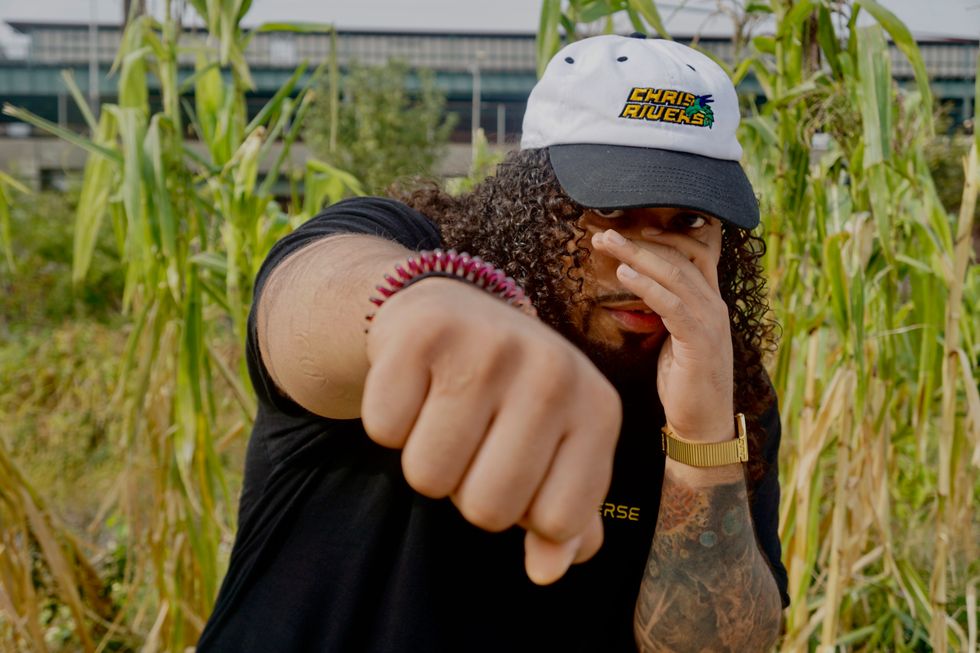
That reminds me of the poet Hanif Abdurraqib. He is always pushing the limits of what he can do within a subject or theme. To write your way out is to breathe.
Yes. And it's perspective. I feel like a lot of my life I have been like detached. Like a big goal of mine is to be more engulfed in the human experience. I feel like I'm a robot or alien, it's weird.
In the 2002 documentary film Still Not a Player, released after your father's passing, there's quote from your mother, Liza Rios, during the end credits where she gives thanks to you and your sisters. How's it feel to know she did that?
Oh, my mom is the greatest. If I'm the greatest in the universe she's the greatest in the omniverse. She um...I know that thanks was genuine, though at that time there's nothing I could say that I did for her actively that probably helped her but I know our existence in itself gave her so much and it means a lot. She says that I'm her favorite child, my sisters know, it's okay.
After your father passed, your family struggled financially and you ended up homeless for quite some time. This must have put strain on the relationship between you and your mother.
Back then ...she gave me my freedom. That was one thing she gave us. She was like, I may not be able to give y'all a lot but I'll always let y'all be yourselves. So all she would is hit me up and be like, Yo, Chris, you still alive? Baby, you still alive? And being homeless at that time, I was by myself. I stayed at my cousins house a lot, who is my manager. I also stayed around a lot of my friends' houses. Which is where I experienced all types of different dynamics and cultures—
Would you say those were good influences?
Absolutely. One of my friends, shout out to Kevin, his mom was a foster mom at the time. She was used to other kids in the house but she treated me like one of her own. My boy Sharife was my first introduction to a real family dynamic. Like my family was very broken up, we didn't have any, like holidays no one was really around, or stuff like that. So I went to his house and his grandmother was there. Everyone she'd given birth to and their kids are there. It was so many people. And I was like whoa this is what it feels like to eat dinner at a table. So it was just blowing my mind and it gave me a lot of culture and perspective and it made me realize like family is — I got blood relatives that don't care about me. But I chose my friends and they're like my family.
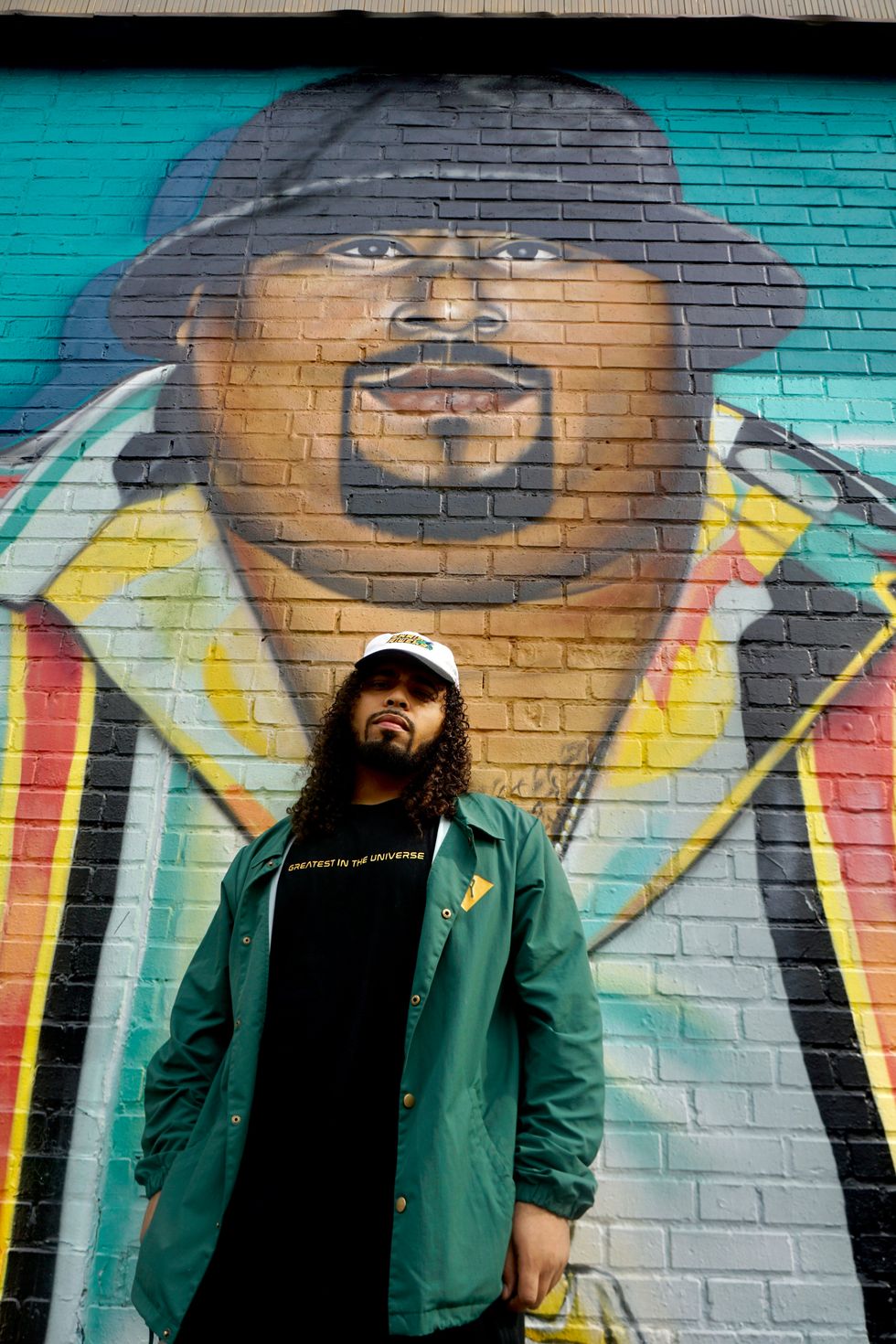
All of this must have taken quite a toll.
We went to the shelter as a family. After we got out of the shelter, we got a home and even then I was still out and about. My mother is pretty strong. A lot of people in her position would have broke. So I started to acknowledge that. It occurred to me that my mother had age her growth as a person stunted since she got with my father, and they had met in their teens. I recognized that I needed to be there for her. She's done so great. I see so much of myself in her, and it's amazing.
For those of us who have lost our fathers, we can sometimes feel as though we're shadowboxing with their memories. How did you manage to find the North Star, that led you to write "Sincerely Me?"
I had forgiven my father way before "Sincerely Me". Even before "Fear of My Crown" which got a lot of controversy and feedback, which was a song about domestic abuse. To clarify, the music video was about the cycle of abuse, but the actual lyrics were from my perspective, going through the things I went through. But with "Sincerely Me", it's one of those things...I'm not super religious, but I am spiritual. But like I don't sit down every day and talk to my dad like, "Hey dad, I really miss ya." When I speak to my dad, though, it's usually through my actions and my medium. And through my music. He did music, too. It's how I relate. It's how I learned the most about him.
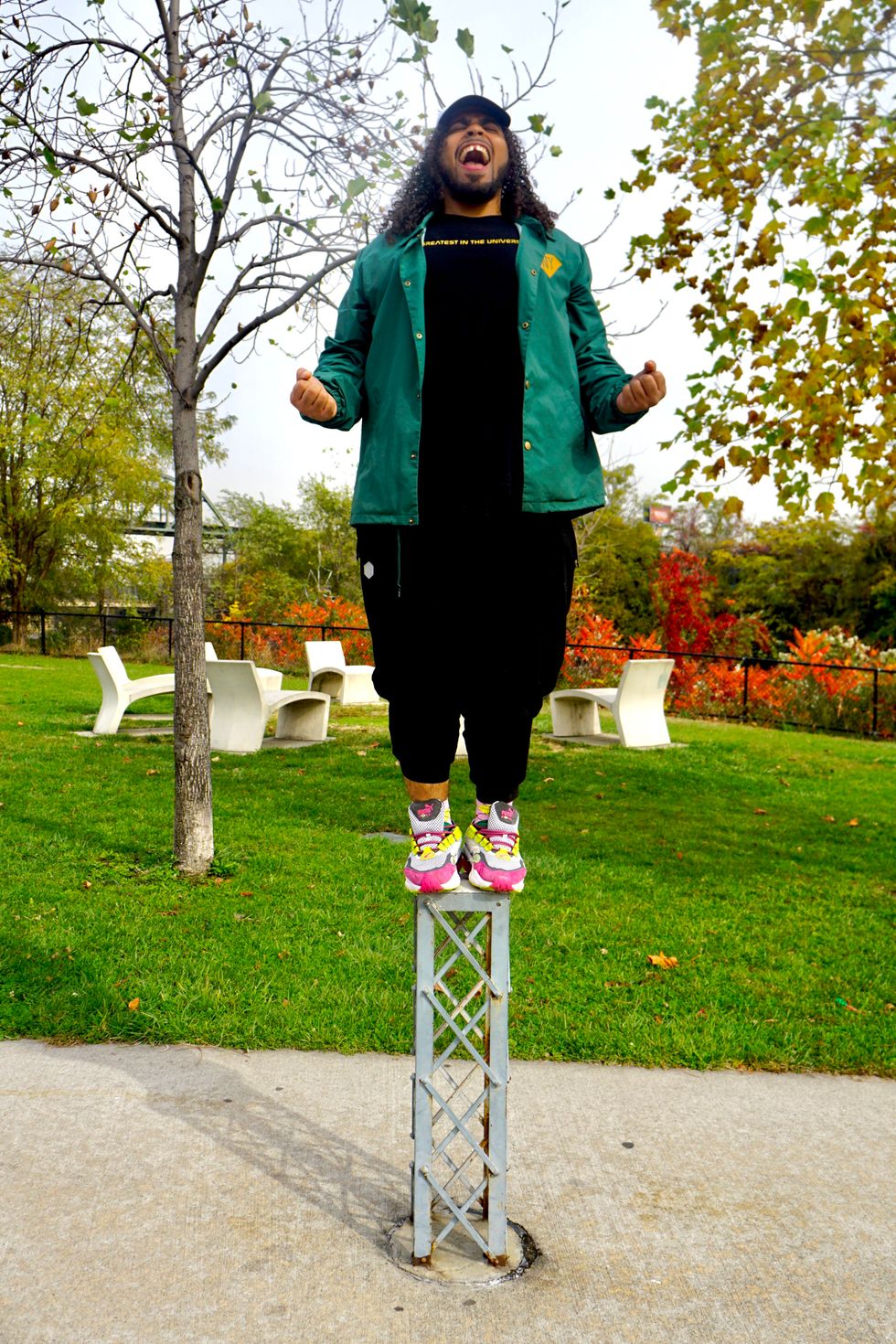
Even though my mom would never approve of the lyrics, we hadn't seen anything quite like your dad in the Latinx community at that time. I'm talking like, in 1998, when I first heard your father. We were like, "It's a Latino rapper!"
And he rode for the community. Like he went out and he used to throw condoms at kids and give people money. He never left, either.
The parallels between you and your father are uncanny sometimes. When listening to "NASA," all I could think of was "Pakinamac." It was like you were a mirror letting us see him again. How does it feel when you're write those bars and you can see his DNA show up in the music?
It's a bit of a funny thing, too, because so many other people reference him or steal his stuff but I'm like, yo, I'm like, the only one where no one can have a problem with me doing this. So when I can pay him homage it's fire to me. And the fact that I'm able to lyrically do it not just like (raps "Pakinamac") but that it flows in and I'm able to rap on that level and put his stuff in, and people come up to him like, yo you're on par with your dad. And even just taking him away as my father, just as an artist, he was arguably one of the greatest of all time. It makes me wonder how much of this is passed down? Like, how much is genetic?
In death, we try really hard to preserve the pristine legacies of our loved ones. I think the way your family has been willing to openly discuss the complex human your father was is very brave.
First and foremost I think it's important to break generational curses. Secondly, it's important to state that we didn't do this in an easy way. It's already hard to talk about these things. You gotta understand in the industry we were also demonized for speaking about this. There was a lot of backlash. Because people often want to glorify the people that they idolize. They only want to see the good parts. When they're exposed to the full human spectrum that they have it can be very difficult for them to process, you understand? I forgave my father because I saw him as a whole.
People are complicated.
Yes, and I understood that he was abused when he was a kid. He translated everything in his life through the lenses he grew up with. He was scared of being abandoned so he felt he had to keep everyone here by an iron vice. Like, if I don't do anything about the fact that we were abused or lived through poverty, and all these things that "defined us" by giving it a purpose, then it was for nothing. Helping people do it is huge, especially as a minority, as a male, and as someone who's been able to articulate it with a voice.
I've been messaged by so many people telling me I've inspired them. They're like, "Yo, you gave me the courage to face myself again," and that to me is priceless. I think a lot of people shy away from it because they fear the backlash or they fear themselves. Like the people who call me a pussy or whatever, as a way to try to emasculate me. But I know I have strength in myself. I know who I am, and that if I speak my truth it doesn't lessen my value as a person. It sustains it. For the people who feel they have to hide behind it, I understand—there's a lot of nuances. I understand their journey is theirs to make. But me, I have to talk about it.
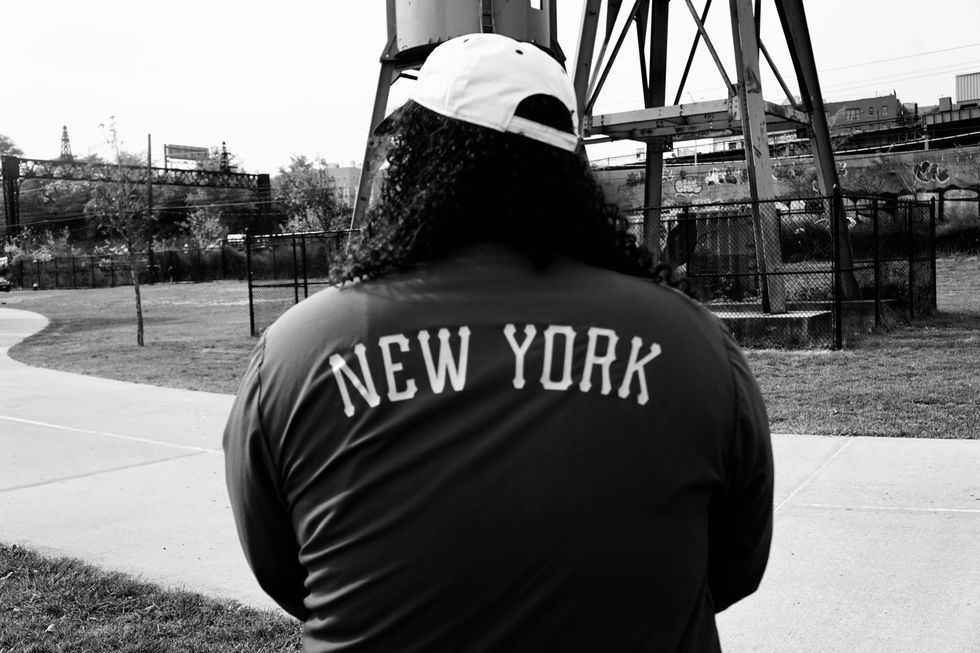
The promise of redemption is evident in songs like "In the Morning" and "Damaged Goods". What would you say to young men who listen to your music but are afraid of admitting their flaws?
Oh yeah, I wanted it to be triumphant. For dudes: you truly gotta understand the true meaning of self-confidence. You can't be a person that's afraid to accept all the pieces of yourself. Bad conditioning is hard-wired into all of us. Personally, I isolated myself. It would have been a lot more beneficial for me to see someone who was an example of how to be. I had to find it online. For any men reading this who are afraid to really be themselves, you gotta find quality men around you and build a community. Me and my bros, we get together and ask each other hey bro, how's your soul? I don't want to sound too preachy about it but there's no way around the work.
In "Wolf Mode" you peel back the layers of stereotypical bravado in order to make a set of stunning revelations. One of which, is attempted suicide. The discussion of mental wellness for men has been rather stunted. Did you feel it was necessary to include that in the album?
Overly. And almost every opportunity I get I try to speak on the topic. For it being one of the biggest things affecting people on a mass scale, it's so not spoken about because so many people are afraid to talk about it or are ignorant to it. It took me years to realize I had anxiety. I'm like why do I always feel like something bad is about to happen. I felt like this impending doom.
How did this discovery change your life?
It gave me the ability to be better equipped to handle it. To be more aware in those moments when I'm having a panic attack to remind myself that it's gonna pass, and that they come from a toxic place, so that I can gently come back to neutral.
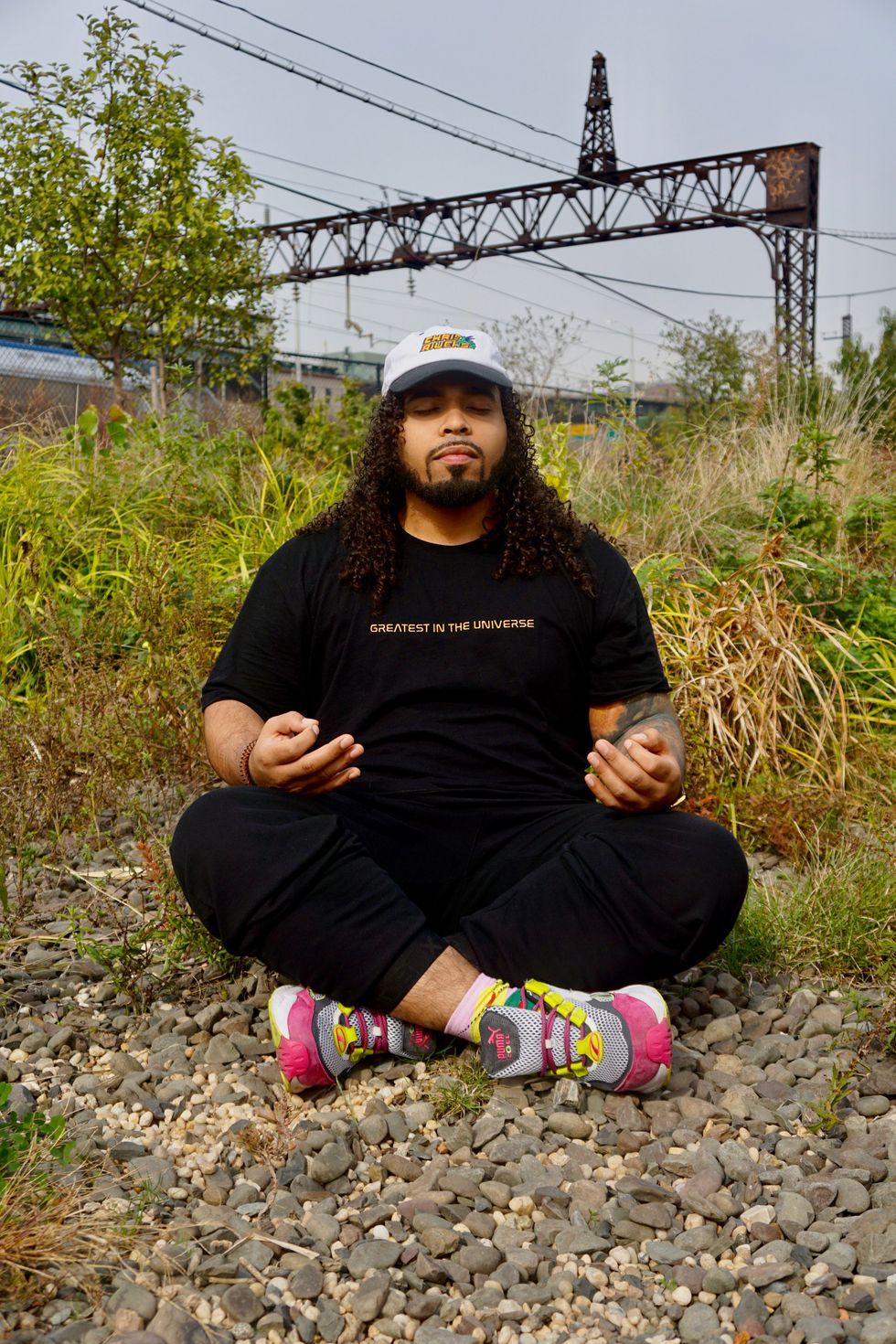
What does your self-care look like?
It's a daily process. It's huge to realize that depression is not the same as sadness. Depression is something you deal with your whole life. You cope with it and learn your patterns. You treat yourself with kindness by understanding your triggers. You discover what you want out of life—a major one for me is being physically healthy. So I incorporate positive affirmations into my routine, especially when I feel tempted to engage in bad habits.
Do you meditate?
I'm getting back into it. When I learned how to meditate I was doing it for 20 minutes a day in the morning and at night, but only achieved meditation for about 4 to 5 seconds at a time. I wasn't quite there. My boy does it, and he like slips into the oneness of the universe. I think everyone should do it and I think they should teach it to kids. It definitely taught me how to be more present, and it helped with managing my thought life and swiping out the negative.
As a man making art that evokes empathy due to its emotional intelligence, what would you say to the femme audience who may be listening to your work—what is the message you want to convey to them?
I think that your father is the first example of how a man should treat you. For daughters it creates a first impression. For sons it's the first example of how you should behave towards the feminine. As a brother, my sisters always told me, damn I wish I could find a guy like you.
I care and show love. There's a trope where you have to be accepting of what's available. Like, just pick from here. And if everyone available is either abusive or alcoholic or a douchebag then I'm gonna pick the douchebag because he's not abusing me. But those aren't the only options. I think that being the guy who is willing to pause and self-reflect, admit to things, is still flawed, but is willing to grow—I think it opens up a dialogue.
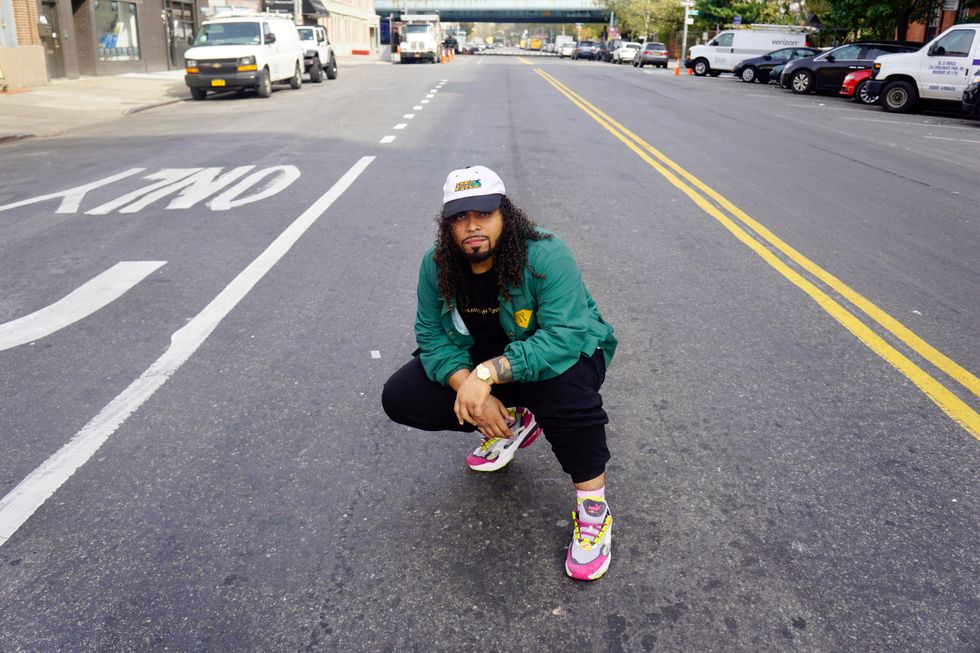
The influence of the LGBTQIA+ community is undeniable and has resulted in a greater move toward inclusivity. One thing I love about your music is that it's for everyone. How do you strike that balance?
Everyone you mentioned is a human. It transcends sexual preference, and that's what's important. Sometimes artists feel like they have to compromise their art for mass appeal. But you have to check your integrity. Am I willing to bust my ass and make 10 albums a year and maybe not see any money off of it? Am I willing to sell my soul so that I can reach the masses but deliver toxic shit that I don't even mess with. Or am I willing to thread the needle to reach the masses but give still give you a message. This route is the long route. 'Cause at the end of the day there's a song on this project for everybody. And I'm convinced you're gonna feel me. That there's something you're going to relate to. Those are personal wins. I want every person to have a personal win with my music.
What does it feel like to be Puerto Rican? Talk about your roots!
So, I'm Nuyorican. Both my parents were born here, so I'm second generation. My father spoke Spanish but didn't like to. So I grew up in an English speaking home so I never learned it too much. But the cooking—all Hispanic. Pastelón is my favorite! Also, my mother's rice. Yo, like...it's legendary. All the women in my family are dumb loud, and it's amazing. Sometimes I would run into the room thinking there was an argument but it was just regular conversation. You get used to that aspect. They're very loving. When the hurricane happened I did multiple charity events and I realized that what I can do is limited by knowledge of the situation. So, I'm like, yo, let me take a step back so I can learn more and picked up the book The War Against All Puerto Ricans. I'm grateful for my roots...I get my hair for it, my complexion and I think the essence of it, like how we are. It's weird because I see some Puerto Ricans who are more Euro, and I'm more on the Black side, so you still get that stigma.
In a 2017 interview, you said, "I want everyone who has been through any form of abuse to know that these things do not decide your worth. These things do not lessen your character or the value of your spirit." Can you talk about the moment when you decided that you were worthy?
I was 15 years old and living in the shelter. I was dating a girl at the time who was cheating on me. I was overweight. I felt like crap about myself. I was depressed. I was at a very low point in my life. One day, my boy was like, "Yo Chris, you should come out to the pool." I was like no, I'm fat, like I don't feel good. I used to tell myself I was worthless just so I could cope with the way life was reflecting worthlessness back at me. So I made a choice. I decided I would be the one to determine my value.
You're in a healthy relationship now. Tell me about how you know it was the right one.
We both thought we'd be single for a very long time. That was our expectation. I was captivated by her—but also felt like, "Oh but it's too soon." I remember the exact moment I realized that I loved her. It was right before G.I.T.U. and I'm stressed out, thinking about the whole project, I gotta structure all this, there's a lot of work that goes into an album. And she's like, "Oh yeah, I got you come over." And I'm like aight cool. And she's sitting down and she has a whole whiteboard out with mad stuff and she's writing everything out about the project, and there was a moment when I got stuck. She looked at me and said, "Nah, we got this."
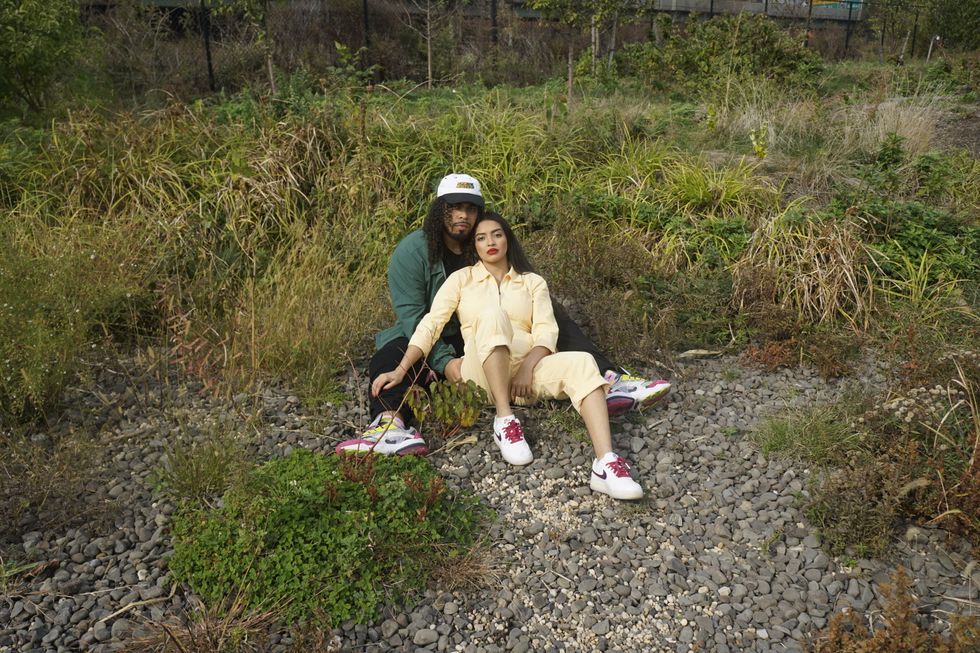
Photography: Freddy Jesse Izaguirre